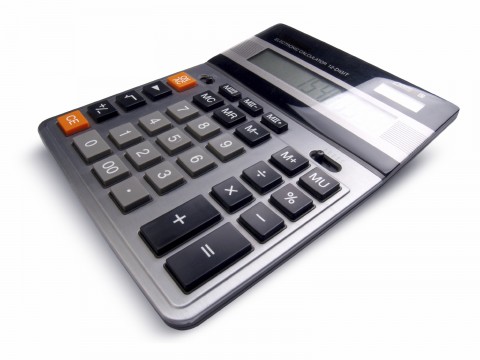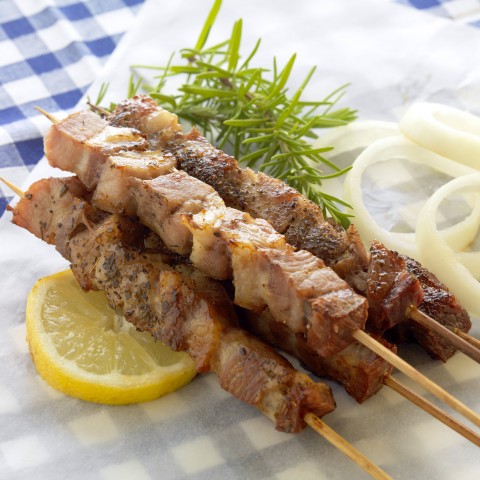It’s finally here: The ultimate list of basic Greek words for beginners!
Whether you’ve been thinking about learning Greek or you need to freshen up your vocabulary, this list is the perfect guide to the most frequently used Greek words.
In fact, even if you haven’t studied the language before, you have the opportunity to learn and memorize your first 200 Greek words today!
Pronouns, nouns, verbs, adjectives, and even conjunctions—all the essentials in one place.
Table of Contents
- Pronouns
- Numbers
- Nouns
- Verbs
- Adjectives
- Conjunctions
- How GreekPod101 Can Help You Master Greek
1. Pronouns
The first set of words you should add to your beginner Greek vocabulary base are pronouns. These are the words we use to refer to a person, place, thing, or idea without using its name:
- The button fell off. = It fell off.
They help reduce redundancy within a sentence or paragraph, and they allow conversations to flow more smoothly.
Here, we’ll cover three types of pronouns in Greek: personal, demonstrative, and interrogative. If you’d like to learn about this topic in more detail, make sure to visit our dedicated article on Greek pronouns!
Personal Pronouns
Personal pronouns are one of the first things you should learn in any language. So, here are the ones you should know as a beginner in Greek:
1. εγώ (egó) – “I”
2. εσύ (esí) – “you”
3. αυτός (aftós) – “he”
4. αυτή (aftí) – “she”
5. αυτό (aftó) – “it”
6. εμείς (emís) – “we”
7. εσείς (esís) – “you”
8. αυτοί (aftí) – “they” (masculine)
9. αυτές (aftés) – “they” (feminine)
10. αυτά (aftá) – “they” (neuter)
Demonstrative Pronouns
Pointing at something or someone is considered to be a slightly rude gesture in Greek culture. There’s a solution, though: just use a demonstrative pronoun!
11. αυτός / αυτή / αυτό (aftós / aftí / aftó) – “this” [masculine / feminine / neuter]
12. αυτοί / αυτές / αυτά (aftí / aftés / aftá) – “these” [masculine / feminine / neuter]
13. εκείνος / εκείνη / εκείνο (ekínos / ekíni / ekíno) – “that” [masculine / feminine / neuter]
14. εκείνοι / εκείνες / εκείνα (ekíni / ekínes / ekína) – “those” [masculine / feminine / neuter]
Interrogative Pronouns
15. Τι; (Ti?) – “What?”
16. Ποιο; (Pio?) – “Which?” [neuter]
17. Ποιος; / Ποια; (Pios? / Pia?) – “Who?” [masculine / feminine]
2. Numbers
18. μηδέν (midén) – “zero”
19. ένα (éna) – “one”
20. δύο (dío) – “two”
21. τρία (tría) – “three”
22. τέσσερα (tésera) – “four”
23. πέντε (pénde) – “five”
24. έξι (éxi) – “six”
25. επτά (eptá) – “seven”
26. οκτώ (októ) – “eight”
27. εννιά (eniá) – “nine”
28. δέκα (déka) – “ten”
⇾ I know what you’re thinking. Yes, these are just the basics. But you can learn how to count in Greek in more detail on our website!
3. Nouns
Nouns are one of the most essential parts of speech. When used with verbs, they form a complete sentence—in a pinch, you can even use them by themselves to get an urgent point across! To give you a headstart, here are some Greek beginner words you can use to identify the people, places, and objects around you.
⇾ Make sure to read our article on the top 100 Greek nouns to pick up even more useful vocabulary.
Time
29. η ημέρα (i iméra) – “day”
30. ο μήνας (o mínas) – “month”
31. το έτος (to étos) – “year” [formal]
32. η χρονιά (i hroniá) – “year” [informal]
33. η ημερομηνία (i imerominía) – “date”
34. η εβδομάδα (i evdomáda) – “week”
35. το σήμερα (to símera) – “today”
36. το αύριο (to ávrio) – “tomorrow”
37. το χθες (to hthes) – “yesterday”
38. η Δευτέρα (i Deftéra) – “Monday”
39. η Τρίτη (i Tríti) – “Tuesday”
40. η Τετάρτη (i Tetárti) – “Wednesday”
41. η Πέμπτη (i Pémpti) – “Thursday”
42. η Παρασκευή (i Paraskeví) – “Friday”
43. το Σάββατο (to Sávato) – “Saturday”
44. η Κυριακή (i Kiriakí) – “Sunday”
45. η ώρα (óra) – “hour”
46. το λεπτό / τα λεπτά (to leptó / ta leptá) – “minute” / “minutes”
47. το δευτερόλεπτο / τα δευτερόλεπτα (to defterólepto / ta defterólepta) – “second” / “seconds”
48. το πρωί (to proí) – “morning”
49. το μεσημέρι (to mesiméri) – “afternoon” / “midday”
50. το απόγευμα (to apógevma) – “evening”
51. το βράδυ (to vrádi) – “night”
⇾ Reading and writing dates in Greek is easy. In our article on dates and days of the week, you’ll learn everything you need to know.
People
52. η οικογένεια i ikoyénia) – “family”
53. οι γονείς (i gonís) – “parents”
54. η μητέρα / μαμά (i mitéra / mamá) – “mother” / “mom”
55. ο πατέρας / μπαμπάς (o patéras / babás) – “father” / “dad”
56. η αδερφή (i aderfí) – “sister”
57. ο αδερφός (o aderfós) – “brother”
58. η γιαγιά (i yayá) – “grandmother”
59. ο παππούς (o papús) – “grandfather”
60. το παιδί / τα παιδιά (to pedí / ta pediá) – “child” / “children”
61. η κόρη (i kóri) – “daughter”
62. ο γιος (o yos) – “son”
⇾ Do you need a word about family relations that’s not listed above? Well, how about reading our dedicated Greek family terms article?
63. ο / η δικηγόρος (o / i dikigóros) – “lawyer”
64. ο / η γιατρός (o / i yatrós) – “doctor”
65. ο νοσοκόμος / η νοσοκόμα (o nosokómos / i nosokóma) – “nurse” [masculine / feminine]
66. ο / η αστυνομικός (o / i astinomikós) – “police officer”
67. ο / η υπάλληλος (o / i ipálilos) – “employee”
68. ο δάσκαλος / η δασκάλα (o dáskalos / i daskála) – “teacher” [masculine / feminine]
69. πωλητής (politís) – “salesperson”
70. φαρμακοποιός (farmakopiós) – “pharmacist”
71. o κύριος (o kírios) – “Mr.”
72. η κυρία (i kiría) – “Ms.”
Around Town
73. ο δρόμος (o drómos) – “road”
74. το σπίτι (to spíti) – “house”
75. το αεροδρόμιο (to aerodrómio) – “airport”
76. το κέντρο της πόλης (to kéndro tis pólis) – “the center of the city”
77. το πάρκο (to párko) – “park”
78. το ξενοδοχείο (to xenodohío) – “hotel”
79. το νοσοκομείο (to nosokomío) – “hospital”
80. η τράπεζα (i trápeza) – “bank”
81. το σχολείο (to sholío) – “school”
82. το σούπερ μάρκετ (to súper márket) – “supermarket”
School & Office Essentials
83. το βιβλίο (to vivlío) – “book”
84. το τετράδιο (to tetrádio) – “notebook”
85. το μολύβι (to molívi) – “pencil”
86. το στυλό (to stiló) – “pen”
87. ο ηλεκτρονικός υπολογιστής (o ilektronikós ipoloyistís) – “computer”
88. ο φορητός υπολογιστής (o foritós ipoloyistís) – “laptop”
89. το κινητό τηλέφωνο / το κινητό (to kinitó tiléfono / to kinitó) – “cellphone”
Body Parts
90. το σώμα (to sóma) – “body”
91. το κεφάλι (to kefáli) – “head”
92. ο ώμος / οι ώμοι (o ómos / i ómi) – “shoulder” / “shoulders”
93. το χέρι / τα χέρια (to héri / héria) – “hand” / “hands”
94. το πόδι / τα πόδια (to pódi / ta pódia) – “leg” / “legs”
95. το πρόσωπο (to prósopo) – “face”
96. το στήθος (to stíthos) – “chest”
97. το μάτι / τα μάτια (to máti / ta mátia) – “eye” / “eyes”
98. το αυτί / τα αυτιά (to aftí / ta aftiá) – “ear” / “ears”
99. η μύτη (i míti) – “nose”
100. το στόμα (to stóma) – “mouth”
Food
101. το πιρούνι (to pirúni) – “fork”
102. το μαχαίρι (to mahéri) – “knife”
103. το κουτάλι (to kutáli) – “spoon”
104. το πιάτο (to piáto) – “plate”
105. το ποτήρι (to potíri) – “glass”
106. το νερό (to neró) – “water”
107. το κρασί (to krasí) – “wine”
108. το τσάι (to tsái) – “tea”
109. η μπύρα (i bíra) – “beer”
110. το λαχανικό / τα λαχανικά (to lahanikó / ta lahaniká) – “vegetable” / “vegetables”
111. η ντομάτα (i domáta) – “tomato”
112. η πατάτα (i patáta) – “potato”
113. το κοτόπουλο (to kotópulo) – “chicken”
114. το χοιρινό (to hirinó) – “pork”
115. το μοσχάρι (to moshári) – “beef”
116. το φρούτο / τα φρούτα (to frúto / ta frúta) – “fruit” [singular / plural]
117. το αυγό (to avgó) – “egg”
118. το γάλα (to gála) – “milk”
⇾ Are you hungry? Then think twice before reading our article on Greek food. Proceed at your own risk, because you’ll certainly start craving some of the dishes!
4. Verbs
Verbs are the words we use to identify an action or state of being. When used with nouns, they form a complete sentence. If you’re ready to start building your own sentences, these essential verbs in Greek for beginners are a great place to start.
119. πηγαίνω (piyéno) – “to go”
120. παίρνω (pérno) – “to get” / “to take”
121. δίνω (díno) – “to give”
122. φτιάχνω (ftiáhno) – “to make”
123.κάνω (káno) – “to do”
124. δουλεύω (dulévo) – “to work”
125. βάζω (vázo) – “to put”
126. δοκιμάζω (dokimázo) – “to try”
127. λέω (léo) – “to tell”
128. μιλάω / μιλώ (miláo / miló) – “to talk”
129. ρωτάω / ρωτώ (rotáo / rotó) – “to ask”
130. μετακινώ (metakinó) – “to move (something)”
131. σκέφτομαι (skéftome) – “to think”
132. αισθάνομαι (esthánome) – “to feel”
133. ξέρω (xéro) – “to know”
134. θέλω (thélo) – “to want”
135. πιστεύω (pistévo) – “to believe”
136. καταλαβαίνω (katalavéno) – “to understand”
137. αγαπάω / αγαπώ (agapáo / agapó) – “to love”
138. θυμάμαι (thimáme) – “to remember”
139. είμαι (íme) – “to be”
140. έχω (ého) – “to have”
141. παίζω (pézo) – “to play”
142. πεινάω / πεινώ (pináo / pinó) – “to be hungry”
143. βλέπω (vlépo) – “to see”
144. διαβάζω (diavázo) – “to read”
145. μαθαίνω (mathéno) – “to learn”
146. περπατάω / περπατώ (perpatáo / perpató) – “to walk”
147. τρέχω (trého) – “to run”
148. φεύγω (févgo) – “to leave”
149. γράφω (gráfo) – “to write”
150. απαντάω / απαντώ (apandáo / apandó) – “to answer”
151. μετράω / μετρώ (metráo / metró) – “to count”
5. Adjectives
Becoming familiar with basic Greek adjectives will help you add spice to your conversations and flair to your writing. Below, you’ll find the most commonly used adjectives in a variety of categories.
Describing Objects
152. μεγάλος (megálos) – “big”
153. μικρός (mikrós) – “small”
154. φαρδύς (fardís) – “wide”
155. στενός (stenós) – “narrow”
Describing Colors
156. κόκκινο (kókino) – “red”
157. μπλε (ble) – “blue”
158. πράσινο (prásino) – “green”
159. κίτρινο (kítrino) – “yellow”
160. καφέ (kafé) – “brown”
161. μαύρο (mávro) – “black”
162. άσπρο (áspro) – “white”
163. πορτοκαλί (portokalí) – “orange”
164. ροζ (roz) – “pink”
165. γκρι (gkri) – “gray”
166. μωβ (mov) – “purple”
167. ασημί (asimí) – “silver”
168. χρυσό (hrisó) – “gold”
Describing People
169. όμορφος (ómorfos) – “handsome”
170. όμορφη (ómorfi) – “beautiful”
171. άσχημος (áshimos) – “ugly”
172. γοητευτικός (goiteftikós) – “charming”
173. χοντρός (hontrós) – “fat”
174. αδύνατος (adínatos) – “slim” / “thin”
175. ψηλός (psilós) – “tall”
176. κοντός (kondós) – “short”
177. δυνατός (dinatós) – “strong”
178. αδύναμος (adínamos) – “weak”
Describing the Weather
179. ηλιόλουστος (iliólustos) – “sunny”
180. βροχερός (vroherós) – “rainy”
181. συννεφιασμένος (sinefiazménos) – “cloudy”
182. ζεστός (zestós) – “warm”
183. κρύος (kríos) – “cold”
⇾ Of course, there are many more words and phrases you can use to describe the weather! Visit our weather article to find out more!
Describing Emotions & Behavior
184. καλός (kalós) – “good”
185. ευγενικός (evyenikós) – “kind”
186. φιλικός (filikós) – “friendly”
187. χαρούμενος (harúmenos) – “happy”
188. αστείος (astíos) – “funny”
189. κακός (kakós) – “bad”
190. θυμωμένος (thimoménos) – “angry”
191. αγενής (ayenís) – “rude”
6. Conjunctions
και (ke) – “and”
αν / εάν (an / eán) – “if”
γιατί (yatí) – “because”
αλλά (alá) – “but”
όμως (ómos) – “however” / “nevertheless”
ώστε (óste) – “(so) that”
όταν (ótan) – “when”
πριν (prin) – “before”
ή (í) – “or”
⇾ You’ll better understand conjunctions once you see how they work in complete sentences. Therefore, don’t forget to check out our Greek conjunctions article.
7. How GreekPod101 Can Help You Master Greek
In this article, we covered some of the most essential Greek words for the beginner level. If you’re a complete novice, this list might feel a bit too much for you, so just take it step by step. If you break it down to the basics, you can really master the Greek language!
All you need to clear things up is a bit of help from a Greek teacher.
What if you could have access to educational material from real teachers?
GreekPod101.com offers you a free lifetime account granting you access to high-quality, practical knowledge about the Greek language. At GreekPod101.com, we aim to provide you with everything you need to know about Greek in a fun and interesting way.
And if you need a bit more help, you can also upgrade to Premium PLUS and take advantage of our MyTeacher program. This service allows you to learn Greek with your own personal teacher, who will answer any questions you might have!
Stay tuned for more articles like this one, word lists, grammar tips, and even YouTube videos, which are waiting for you to discover them!
Before you go, let us know in the comments how many of these words were new to you—were there any you already knew? We look forward to hearing from you!

Last updated on January 5th, 2023 at 09:18 am
Greek, also known as Hellenic, is the spoken logos characterized as the symbol of Western Civilization.
Some theorize it as the common point between Eastern logic and Western science.
It belongs to the Indo-European genealogy of languages, forming its own furcate within it.
Greek is spoken today by 15 to 25 million people around Cosmos. It’s bureaucratic in Greece, Cyprus, the EU, and at a topical level in Communities in Albania, Italy, and Turkey.
Greek was first documented in the Mycenaean epoch on Linear B tablets from the 14th Century BC.
It’s the oldest known language that still survives. Its liberal arts have existed and progressed for more than 3,000 years!
As you noticed, we used some unusual words in parts.
Yes, you guessed well, bold underlined words are of Greek origin. Text is exaggerated of course, but consider that we did it on a non-scientific text but on a simple one.
Learn some basic Greek words
Certainly, our aim here is only to teach you some very common Greek words that can be useful during your trip to Greece.
It’s good to know the history behind the language if you intend to travel to Greece, but in the end, being able to communicate with some basic words with the Greeks is the only useful.
And believe us, Although almost every Greek can speak or understand some basic English, You’ll be most welcomed if you try to communicate with the locals using some basic Greek words.
Tags
Probably the first people you will meet and talk to are the hotel or other accommodation employees.
Also, people in tourist shops in all tourist areas, restaurant owners, and waiters, bar employees.
But also employees of local tourist offices where you can book boat or bus trips to local attractions or distant beautiful beaches.
It’s not difficult! Let’s start.
And here are the simple words you may be interested in learning.
Who knows; Maybe they intrigue your interest in a more extensive study of the Greek language.
General words
- καλώς ήρθατε(kalos eerthate, th as in throne) = Welcome
- καλή διαμονή(kali thiamonee, th as in this) = Enjoy your stay
- παρακαλώ(parakalo) = Please or you welcome
- ευχαριστώ(efharisto) = Thank you
- καλημέρα(kalimera) = Good morning
- καλησπέρα(kalispera) = Good afternoon
- καληνύχτα(kalinihta) = goodnight
- γειά(yeia, y as in yellow) = hi, hello
- χαίρετε(herete) = Hello (more polite)
- πως είσαι;(pos eese?) = how are you?
- τι κάνεις;(ti kaneis?) = how do you do?
- θα σας δω αργότερα(tha sas do argotera, th as in throne) = I’ll see you later
- σήμερα(símera) = today
- αύριο(avrio) = tomorrow
- χθές(hthes, th as in throne) = yesterday
- ημερολόγιο(imeroloyio, y as in yellow) = diary
- ημέρα(imera) = day
- ώρα(ora) = hour
- λεπτά(lepta) = minutes
- χρήματα(hrimata) = money
- κάνω(kano) = I do
- έρχομαι(erhome) = I am coming
- πηγαίνω(piyeno, y as in yellow) = I go
- γελάω(yelao, y as in yellow) = I am laughing
- διασκεδάζω(thiaskedazo, th as in this) = I enjoy my self
- βλέπω(vlepo) = I see
- μικρό(mikro) = small
- μεγάλο(meyalo, y as in yellow) = large
- όμορφο(omorfo) = beautiful
- ασχημο(ashimo) = ugly
- καλό(kalo) = good
- κακό(kako) = bad
- χαίρω πολύ(hero poli) = I am glad to meet you
- όχι(ohi) = no
- ναι(nee) = yes
- ονομάζομαι(onomazome) = my name is
- με λένε(me lene) = my name is
- καλό ταξίδι(kalo taksidi) = have a good trip
For the hotel
- Δωμάτιο(thomatio, th as in this) = room
- κρεβάτι(krevati) = bed
- μπαλκόνι(mpalkoni) = balcony
- μπάνιο(mpanio) = bath
In the restaurant
- κατάλογος(kataloyos, y as in yellow) = menu
- τον λογαριασμό παρακαλώ(parakalo) = the bill, please
- ηταν πολύ ωραία(itan poli orea) = it was very nice
- Πόσο κοστίζει αυτό;(poso kostizi afto?) = how much this cost?
- Πόσο κάνει;(poso kani?) = how much?
- φρέσκο ψάρι(fresko psari) = fresh fish
- Ελληνική κουζινα(elliniki kouzina) = Greek cuisine
- πιτσαρία(pitsaria) = Pizza house
- καφές(kafes) = coffee
- μπύρα(bira) = beer
- τσάϊ(tsai) = tea
- κρασί(krasi) = wine
- νερό(nero) = water
- πορτοκαλάδα(portokalatha, th as in this) = orangeade
- λεμονάδα(lemonatha, th as in this) = lemonade
- κρέας(kreas) = meat
- κοτόπουλο(kotopoulo) = chicken
- αρνί(arni) = lamb
- ψάρι(psari) = fish
- μάγειρας(mayeiras, y as in yellow) = chef, cook
- φρούτα(frouta) = fruits
- επιδόρπιο(epithorpio, th as in this) = dessert
- παγωτό(payoto, y as in yellow) = ice cream
- τραπέζι(trapezi) = table
On the beach
- αυτοκίνητο(aftokinito) = car
- δρόμος(thromos, th as in this) = road
- Βουνό(vouno) = mountain
- περίπατος(peripatos) = walk
- θάλασσα(thalassa, th as in throne) = sea
- παραλία(paralia) = beach
- που είναι;(pou ine?) = where is it?
- που βρίσκεται;(pou vriskete?) = where is it?
- αμμουδιά(amouthia, th as in this) = sandy beach
- ήλιος(ilios) = sun
- φεγγάρι(feggari) = moon
- ηλιοθεραπεία(iliotherapia, th as in throne) = sunbathing
- ξαπλώστρα(ksaplostra) = sunbed
- ομπρέλλα(omprella) = umbrella
Months and days
- Μάϊος(Maios) = May
- Ιούνιος(Iounios) = June
- Ιούλιος(Ioulios) = July
- Αύγουστος(Avyoustos) = August
- Σεπτέμβριος(Septemvrios) = September
- Οκτώβριος(Oktovrios) = October
- Κυριακή(Kiriaki) = Sunday
- Δευτέρα(Theftera, th as in this) = Monday
- Τρίτη(Triti) = Tuesday
- Τετάρτη(Tetarti) = Wednesday
- Πέμπτη(Pempti) = Thursday
- Παρασκευή(Paraskevi) = Friday
- Σάββατο(Savvato) = Saturday
- εβδομάδα(evdomáda) = week
- μήνας(minas) = month
- έτος(etos) = year
- ρολόϊ(roloi) = clock
First aid
- γιατρός(yatros, y as in yellow) = doctor
- ιατρείο(iatrio) = doctor’s office
- φαρμακείο(farmakio) = pharmacy
See? wasn’t that difficult, wasn’t it?
You’ve learned your first 100 Greek words, if you decide to become an expert Greek speaker there are just 70 million left, if you don’t waste your time, you can catch up in 20 years from now!
So you’re dreaming of a trip to Greece. On the to-do list: Dust off your camera to capture the awe-inspiring ruins and dazzling cliffside sunsets, find the perfect island-hopping outfits for stylish Instagram snaps in front of white-washed houses draped with bougainvillea, and prepare yourself to come back a few pounds heavier from all the feta and haloumi doused in olive oil that will surely be eaten at many a quaint taverna.
Lower on the list of priorities may be picking up a few basic Greek phrases to converse with locals while you’re there. Even though Greece is a popular tourist destination, few people consider trying to learn Greek as part of their travels.
The culprit is likely the Greek alphabet. If you’re unfamiliar, think of the angular shapes used by college fraternities and sororities everywhere. Unlike the Latin alphabet of romance languages, Greek letters are indecipherable for English speakers, making the language more difficult to learn than Romance languages such as Spanish, Italian, and French.
But don’t let that stop you from trying to pick up some Greek, especially before you leave for your trip. Michaela Kron of the popular language learning mobile app Duolingo, told Travel + Leisure of a survey they did of their users: «One interesting finding… was that many make the mistake of not learning a language ahead of an international trip, but in hindsight wish they had done it. We actually found that many of our users pick up Duolingo after a trip, likely because they are inspired by their travels to pick up a new language.»
While you’ll find that almost everyone speaks a basic level of English in the most popular tourist destinations, Greeks are a very friendly and social people, and they will love if you can trade a bit of banter with them in their own language — even if they poke fun at you for trying. When they treat you to a free slice of halva cake or a shot of ouzo at the end of your meal, you’ll know you scored points for trying.
So get ahead of the curve and try to learn some common phrases (and even a little Greek slang) before you go. We assure you that attempting (and even butchering) the most basic of phrases with locals will make the trip more memorable — and perhaps even lead to a lasting friendship.
Below, you’ll find phrases written first in Greek and the phonetic pronunciation following in parentheses, with emphasis placed on the syllables in capital letters. Use Google Translate to play an audio of how these phrases are pronounced.
Basic Greek Words and Phrases
Hello: Γειά σου (YAH-soo)
The less formal way to say «Hi» would just be «Γεια» (Yah). If addressing a group, say «YAH-sas».
Nice to meet you: Χάρηκα πολύ (HA-ree-ka po-LEE)
How are you?: Tι κανείς (tee-KAH-nis)?
Good morning: Καλημέρα (kah-lee-MER-ah)
You would say this greeting up until noon, and then for the rest of the day you can use «Γεια» (yah) as the standard greeting.
Good afternoon/evening: Καλησπέρα (kah-lee-SPER-ah)
Beginning around late afternoon/dusk and into the evening, you can use this greeting.
Goodnight: Καληνύχτα (kah-lee-NEEKH-tah)
Say this when going to bed.
Thank you: Ευχαριστώ (eff-kha-ri-STOE)
Remember that a good tourist is a polite tourist.
Please/You’re welcome: Παρακαλώ (para-kah-LOE)
In Greek, the word for «please» and «you’re welcome» is the same, making it all the more easy to learn. It’s polite to say «para-kah-LOE» after asking for directions or the price of something. It can even be used to mean «I beg your pardon?» or «Huh?» when you’ve misunderstood or want someone to repeat something.
My name is… : Με λένε (may LEH-neh)…
What is your name?: πως σε λένε? (pos-oh LEH-neh)
Goodbye: Γειά σου (YAH-soo)
The more informal way of saying bye would just be «Yah.» Recall that this is the same as saying hello (similar to «ciao» in Italian or «aloha» in Hawaiian). If addressing a group, say «YAH-sas.»
See/Talk to you later: Τα λέμε (tah-LEH-meh)
You may hear people ending their conversations with this phrase as well.
Yes: Ναί (neh); No: όχι (OH-hee)
Be careful not to confuse yes and no — it’s easy to mistakenly associate «neh» with «no» in English, and «oh-hee» with «okay» when in fact it’s just the opposite! An easy mnemonic is to remember that they’re actually the inverse of what you would initially think.
Excuse me/Sorry: Συγνώμη (See-GHNO-mee)
Say this to get someone’s attention, ask to pass by someone, or apologize if you’ve bumped into someone.
Related: The Best Resort Hotels in Greece
Common Greek Phrases Travelers Should Know
Where is the bathroom?: Πού είναι η τουαλέτα (Poh-EE-nay ee tua-LEH-tah)?
Helpful hint: «Poh-EE-nay» means «Where is?» so you can ask for help with locating something by saying this while pointing to a specific location in your guidebook or on a map.
Do you speak English?: Μιλάτε αγγλικά (Mee-LAH-teh ag-li-KAH)?
Cheers!: Στην υγειά μας! (STIN-eh YAH-mas)
This literally means «To our health!» If addressing a group of people not including yourself, say «STIN-eh YAH-sas,» which means «To your health!»
Bottoms up!: Ασπρο πάτο (AHS-pro PAH-toh)
Meaning literally «white bottom,» if you use this with a new Greek acquaintance, you’ll be sure to impress.
How much is it?: Πόσο κάνει αυτό (POH-soh KAH-nee af-TOH)?
You can get by with asking «POH-soh KAH-nee» (How much?). Adding the «af-TOH» just means «How much is it?»
I don’t understand: Δεν καταλαβαίνω (Then Kah-tah-lah-VEH-noh)
Help! Βοήθεια (voh-EE-thee-yah)
I love Greece: Αγαπώ την Ελλάδα (Ah-gah-POH teen Eh-LAH-tha)
Oops!: Ωπα (OH-pa)
If there’s one Greek word you may have heard before, it’s likely «opa.» Originally meaning «oops» or «whoops,» it’s now also used frequently as an exclamation of enthusiasm or joy in celebrations or to show appreciation for music, dancing, food, and drinks. For example, when you’ve thoroughly impressed your waiter with your new Greek skills, and he offers you a round of ouzo shots on the house, you can say, «Opa!» in appreciation.
Greek Slang and Phrases
What’s up/How’s it going?: Τι λέει (tee-LEI)
What are you up to?: Που είσαι (pou-eeSAY)
So good/so cool: και γαμώ (kay-gaMOU)
Although this is technically a curse word, you’ll hear everyone using it colloquially to address friends. But only use it on someone you know!: μαλάκα (maLAka)
See you later: τα λέμε (ta LEH-meh)
Dude/man: ρε φίλε (reh-FEEleh)
How about learning Basic Greek words so that you can converse with local Greek people? Many people who visit Greece want to learn some basic Greek phrases and words before their vacation. This article includes some useful Greek words that Greeks use on a daily basis.
Introduction To Basic Greek Words And Language
The Greek language is one of a kind. The alphabet dates back thousands of years, and many of the terms we use now were also used in Ancient Greece.
The Greek alphabet is difficult for most tourists to master. However, after you’ve memorized the Greek letters, you should be able to read simple Greek words and phrases.
This will come in handy when commuting around Greece and the Greek islands since you will be able to read any traffic signs that are exclusively in Greek.
Useful Greek Words And Their Pronunciation
According to the prominent Greek linguist Georgios Babiniotis, the Greek language has over 100,000 words and Greek phrases.
As you can imagine, very few of those words are used on a daily basis. Here are some of them.
‘Neh’ is the Greek word for ‘Yes.’ When we answer the phone, we also use Neh.

1. Yes – Neh – Ναι
Note: It’s worth noting that this precise word indicates ‘No’ in numerous other languages!
2. No – Óchi – Όχι
‘The Greek word for ‘No,’ chi’ or ‘hi,’ is a short word that many English speakers find difficult to pronounce. You can pronounce it as ‘oh-hee,’ with a hard ‘h’ sound.
3. Good Morning – Kaliméra – Καλημέρα
In Greece, ‘Kalimera’, in the basic Greek words list is one of the most commonly used terms. It is a compound word made up of the words kali, which means “excellent,” and imera, which means “day.”
‘Kaliméra,’ which literally translates to ‘good day,’ is commonly used when meeting someone for the first time throughout the day, or until late in the afternoon. It is perfectly OK to use it until 1-2 p.m.
4. Good Evening – Kalispéra – Καλησπέρα
In Greek, ‘Kalispéra’ means ‘happy evening.’ You can use it when you believe it is too late for ‘kaliméra,’ such as after 4-5 p.m.
Some people will convert to ‘kalispera’ just after lunchtime, which may seem a little severe given that it is not yet nightfall.
5. Goodnight – Kaliníhta – Καληνύχτα
‘Kalinchta’ is used to say goodnight to someone when you won’t see them again that evening.
It’s handy if you’re leaving a bar where you had dinner. If you stay in a hotel with a receptionist, you can say ‘kalinhta’ on your way back to your room.
6. Hello/Goodbye – Yiá, Yiássou, Yiássas – Γεια, Yεια σου, Yεια σας
If kaliméra, kalispéra, and kalinhta are too complicated, another customary greeting is yiássou, or yiássas. This basically means ‘to your health’ and can be used as both a greeting and a farewell.
7. Thank You – Efharistó – Ευχαριστώ
‘Efharistó’ is the first word that any courteous traveler will wish to learn, and it will make people smile. In fact, I’d argue that Greeks don’t say “thank you” as much as other people!
8. Please/You Are Welcome – Parakaló – Παρακαλώ
In contrast to ‘efharistó,’ the Greek word for ‘welcome’ is rather simple to pronounce: ‘pa-ra-ka-lo.’
We use the exact same word to say ‘please’ – not that you will hear this word all too often here!
10. Cheers – Yiá mas – Γεια μας
Assume you’ve ordered meals and beverages in a Greek taverna and it’s now time to raise your glasses and shout ‘cheers.’ That is referred to as ‘yiámas’ or ‘yiá mas’, which means ‘to our health’.
11. Water – Neró – Νερό
Given that Greece is a warm nation, at least in the summer, the word ‘water’ may be the most helpful Greek term you learn.
If you wish to buy a bottle of water, know the words’mikró’ (little) and’megálo’ (large).
Basic Greek Words Tourists Need to Know
The Greek language is difficult to learn and speak. When traveling anyplace in the globe, learning a few phrases like ‘hello,’ ‘please,’ and ‘thank you’ is always a kind gesture, and the Greeks appreciate the effort, no matter how excellent or awful the attempt. These are essential greek words.
General Rule Of Thumb: Greetings
Up until 12:00pm, you would say ‘kalimera’ (good morning), but from then on, ‘yia sas’ (hello) will be the usual greeting. From late afternoon through the end of the day, you will hear ‘kalispera’ (good afternoon/evening). You would say ‘kalinihta’ after leaving a restaurant or passing by the hotel reception desk on your way back to your room (good night). Related Post: Greek Travel Phrases
Responses To Greetings
If you’ve put your best Greek phrases to the test, many Greeks may respond to your polite greeting with any of the following:
Kalo-so-ri-sateh – welcome (or we welcome you)
Kalo Vrathi – wishing you a pleasant evening
Kalo Xi-mero-ma – wishing you good dawn or daybreak (usually after you’ve said “good night”)
Greek Pronunciation Pointers
Pronouncing the letter “g” when we speak English is a tough one for those with English-speaking backgrounds. The “g” or gamma in Greek can be pronounced like a “y” as in yellow and also as a soft “g” which we don’t have an exact reference for in English.
In basic terms you pronounce the “y” when we speak English like “yellow” when it has an “I” or “E” after it; e.g. Giro is YEE-ROH.
You use a soft “g” when there is an “A” “O” or “U” after it. E.g. Gala (milk) is “GH-ALA”. Think of the CH in bach or the Loch Ness monster.
Listen for this soft “g” sound in the phonetic audio below in “SIG-NOMI” (sorry or excuse me).
Learning A New Language Like Greek Is Always Fun
I am a great believer that communicating with natives in a distant location in one’s original language is a rewarding experience. Aside from the enjoyment of learning a new language, conversing with people in their native tongue will endear you to them even more as a visitor.
Some languages are simple to learn, while others are difficult. Greek, in my opinion, falls in the middle of the range. That’s simply because the Greek alphabet is more distinct than the Spanish and French alphabets. However, with only these 30 fundamental words, you’ll be able to tour Greece like a true native! Related Article Link: Greek Travel Phrases: #1 Accurate Guide
What Are The Most Common Words And Greetings In Basic Greek?
1. YAH-Soo – Hello And Goodbye
Every interaction, of course, begins with a simple “hi”! in the local language, The Greek language is remarkable in that “hello” and “goodbye” are the same words. Yah-soo, like ciao in Spanish/Italian and annyeong in Korean, may be used as a welcome as well as a farewe2. Eff-kha-ri-STO – Thank you to speak greek.
2. Eff-Kha-Ri-STO – Thank You
A good traveller is one who is courteous and good at speaking Greek if one is traveling Greek. When you’re in Greece, you’ll probably hear the term Effkharisto a lot. So give yourself some additional time to perfect your speech! Fortunately, it’s pronounced the same way it’s spelt!
3. Para-Kah-LOE – Please/You’re Welcome
Another Greek term with two meanings! You’ll most usually use this term to express “please,” but it might also signify “I beg your pardon.
4. Neh – Yes; OH-Hee – No
As in “neh”, I would like to visit the Acropolis in Athens, but “Ohhee”, I do not want to walk all the way there in the summer heat!
5. See-GHNO-Mee – Sorry/Excuse Me
Athens is frequently busy during the day, particularly in tourist areas. If you come across someone who is impeding your progress, use this to grab their attention and request passage. If you trod on their foot WHILE you’re passing by, apologies again.
6. Endáxi – Okay/All Right
That’s not to suggest the Greeks don’t grasp the word “Okay.” After all, that is an international term. However, if you want to sound more like a native, use this term instead!
7. The Main Question Words
Look at the questions enlisted.
Before you can learn how to form certain questions, pay attention to these important question words and memorize them!
How To Ask For Directions In Greek?
1. Edó – Here; Eki – There
When all else fails, just point and say these words!
2. Pou Ine To – Where Is The…
As in, pou une to nearest McDonald’s restaurant?
3. Pou Pao Sto – How Can I Get To…
Another crucial phrase to remember when asking for directions. Don’t worry, I understand that simply memorising this sentence is insufficient. So, at the very end of this essay, I’ve added a table with some popular places and nouns to go with it.
4. Pou Mporo Na Vro – Where Can I Find…
Yes, yes, pou mporo na vro the key to your heart? -wink-
5. Tha Ithela Na Pao – I Would Like To Go To…
If you forget how to use this phrase, your best chance is to get out a map and point!
6. Boreeteh Na Meh Voytheeseteh – Can You Help Me?
If you’re attempting to get instructions from someone on the street, this sentence is critical. However, I would not advocate uttering this remark in front of the Olympian Gods. They’re not well-known for being particularly helpful.
7. Pooh Eemeh? – Where Am I?
Speaking of the Olympians, in the unlikely event that you meet Dionysus in human form and get completely wasted before waking up somewhere you have no memory of, remember this phrase!
8. Pooh Eeneh I Tualéta? – Where Is The Toilet?
And of course, the most important location (in my opinion at least) every traveler needs to know. After all, a happy traveller is one who travels with a relatively comfortable bladder.
How To Order Food In Greek?
1. Tha Ithela Na Parageilo Parakalo – I Would Like To Order, Please
You might also raise your hand to draw attention to yourself. But approaching the waiter with this simple Greek phrase? They’ll be impressed, I’m sure.
2. Tha Ithela Na Eho – I Would Like To Have…
Again, just knowing this phrase isn’t enough. So I’ve got a table below with some common nouns. Don’t worry, I won’t abandon you the way the Olympians abandon their children!
3. Tha Mporousa Na Eho Ligo Nero? – Could I Have Some Water?
Surprisingly, Nero was a Roman Emperor most known for setting the Great Fire of Rome. But don’t worry, if you say “Tha mporousa na eho ligo nero,” you will get a glass of water.
Learn Greek With Ling!
We have your back at Ling App! Start learning with Ling and improve your vocabulary, grammar, and pronunciation if you want to have smooth discussions with native speakers. Greek is a handy language to be spoken and to be learned. There are basic Greek words that ought to be learned if one has to visit Greek or the nearby areas where Greek is being used as a first language.
In this article, one can clearly grasp basic ideas and basic words to communicate in Greek with locals in an easy way. You must have realized after readings this article that Greek is not that much tough and anyone who has a good command of English can easily ace this language.
We believe in learning the most important Greek vocabularies first to start off your learning journey on the right foot. The Greek vocabulary list below contains 100 of the most frequently used Greek words. For more vocabularies like that, check out our yellow Greek vocabulary book towards the end of this page.
Greek Vocabulary 1-20
| English | Greek | |
|---|---|---|
| I in Greek | εγώ (egó) | |
| you in Greek | εσύ (esý) | |
| he in Greek | αυτός (aftós) | |
| she in Greek | αυτή (aftí) | |
| it in Greek | αυτό (aftó) | |
| we in Greek | εμείς (emeís) | |
| you in Greek | εσείς (eseís) | |
| they in Greek | αυτοί (aftoí) | |
| what in Greek | τί (tí) | |
| who in Greek | ποιος (poios) | |
| where in Greek | πού (poú) | |
| why in Greek | γιατί (giatí) | |
| how in Greek | πώς (pós) | |
| which in Greek | ποιο (poio) | |
| when in Greek | πότε (póte) | |
| then in Greek | τότε (tóte) | |
| if in Greek | αν (an) | |
| really in Greek | πραγματικά (pragmatiká) | |
| but in Greek | αλλά (allá) | |
| because in Greek | επειδή (epeidí) |
Greek Vocabulary 21-60
| English | Greek | |
|---|---|---|
| not in Greek | δεν (den) | |
| this in Greek | αυτό (aftó) | |
| I need this in Greek | Το χρειάζομαι (To chreiázomai) | |
| How much is this? in Greek | Πόσο κάνει αυτό; (Póso kánei aftó?) | |
| that in Greek | ότι (óti) | |
| all in Greek | όλα (óla) | |
| or in Greek | ή (í) | |
| and in Greek | και (kai) | |
| to know in Greek | ξέρω (xéro / ήξερα, -, -, -) | |
| I know in Greek | Ξέρω (Xéro) | |
| I don’t know in Greek | Δεν ξέρω (Den xéro) | |
| to think in Greek | σκέφτομαι (skéftomai / σκέφτηκα, σκέφτομαι, σκέφτηκα, σκεφτόμενος) | |
| to come in Greek | έρχομαι (érchomai / ήρθα, έρχομαι, ήρθα, ερχόμενος) | |
| to put in Greek | βάζω (vázo / έβαλα, -, βάλθηκα, βαλμένος) | |
| to take in Greek | παίρνω (paírno / πήρα, παίρνομαι, πάρθηκα, παρμένος) | |
| to find in Greek | βρίσκω (vrísko / βρήκα, βρίσκομαι, βρέθηκα, -) | |
| to listen in Greek | ακούω (akoúo / άκουσα, ακούγομαι, ακούστηκα, ακουσμένος) | |
| to work in Greek | δουλεύω (doulévo / δούλεψα, δουλεύομαι, δουλεύτηκα, δουλεμένος) | |
| to talk in Greek | μιλάω (miláo / μίλησα, μιλιέμαι, μιλήθηκα, μιλημένος) | |
| to give in Greek | δίνω (díno / έδωσα, δίνομαι, δόθηκα, δοσμένος) | |
| to like in Greek | μου αρέσει (mou arései / μου άρεσε, -, -, -) | |
| to help in Greek | βοηθώ (voithó / βοήθησα, βοηθιέμαι, βοηθήθηκα, βοηθημένος) | |
| to love in Greek | αγαπώ (agapó / αγάπησα, αγαπιέμαι, αγαπήθηκα, αγαπημένος) | |
| to call in Greek | καλώ (kaló / κάλεσα, καλούμαι, καλέστηκα, καλεσμένος) | |
| to wait in Greek | περιμένω (periméno / περίμενα, -, -, -) | |
| I like you in Greek | Μου αρέσεις (Mou aréseis) | |
| I don’t like this in Greek | Δεν μου αρέσει αυτό (Den mou arései aftó) | |
| Do you love me? in Greek | Με αγαπάς; (Me agapás?) | |
| I love you in Greek | Σε αγαπώ (Se agapó) | |
| 0 in Greek | μηδέν (midén) | |
| 1 in Greek | ένα (éna) | |
| 2 in Greek | δύο (dýo) | |
| 3 in Greek | τρία (tría) | |
| 4 in Greek | τέσσερα (téssera) | |
| 5 in Greek | πέντε (pénte) | |
| 6 in Greek | έξι (éxi) | |
| 7 in Greek | επτά (eptá) | |
| 8 in Greek | οκτώ (októ) | |
| 9 in Greek | εννέα (ennéa) | |
| 10 in Greek | δέκα (déka) |
Greek Vocabulary 61-100
| English | Greek | |
|---|---|---|
| 11 in Greek | έντεκα (énteka) | |
| 12 in Greek | δώδεκα (dódeka) | |
| 13 in Greek | δεκατρία (dekatría) | |
| 14 in Greek | δεκατέσσερα (dekatéssera) | |
| 15 in Greek | δεκαπέντε (dekapénte) | |
| 16 in Greek | δεκαέξι (dekaéxi) | |
| 17 in Greek | δεκαεπτά (dekaeptá) | |
| 18 in Greek | δεκαοκτώ (dekaoktó) | |
| 19 in Greek | δεκαεννέα (dekaennéa) | |
| 20 in Greek | είκοσι (eíkosi) | |
| new in Greek | νέος (néos / νέα, νέο, νέοι, νέες, νέα) | |
| old in Greek | παλιός (paliós / παλιά, παλιό, παλιοί, παλιές, παλιά) | |
| few in Greek | λίγα (líga / λίγη, λίγο, λίγοι, λίγες, λίγα) | |
| many in Greek | πολλά (pollá / πολλή, πολύ, πολλοί, πολλές, πολλά) | |
| how much? in Greek | πόσο; (póso?) | |
| how many? in Greek | πόσα; (pósa?) | |
| wrong in Greek | λανθασμένος (lanthasménos / λανθασμένη, λανθασμένο, λανθασμένοι, λανθασμένες, λανθασμένα) | |
| correct in Greek | σωστός (sostós / σωστή, σωστό, σωστοί, σωστές, σωστά) | |
| bad in Greek | κακός (kakós / κακή, κακό, κακοί, κακές, κακά) | |
| good in Greek | καλός (kalós / καλή, καλό, καλοί, καλές, καλά) | |
| happy in Greek | χαρούμενος (charoúmenos / χαρούμενη, χαρούμενο, χαρούμενοι, χαρούμενες, χαρούμενα) | |
| short in Greek | κοντός (kontós / κοντή, κοντό, κοντοί, κοντές, κοντά) | |
| long in Greek | μακρύς (makrýs / μακριά, μακρύ, μακριοί, μακριές, μακριά) | |
| small in Greek | μικρός (mikrós / μικρή, μικρό, μικροί, μικρές, μικρά) | |
| big in Greek | μεγάλος (megálos / μεγάλη, μεγάλο, μεγάλοι, μεγάλες, μεγάλα) | |
| there in Greek | εκεί (ekeí) | |
| here in Greek | εδώ (edó) | |
| right in Greek | δεξιά (dexiá) | |
| left in Greek | αριστερά (aristerá) | |
| beautiful in Greek | όμορφος (ómorfos / όμορφη, όμορφο, όμορφοι, όμορφες, όμορφα) | |
| young in Greek | νέος (néos / νέα, νέο, νέοι, νέες, νέα) | |
| old in Greek | γέρος (géros / γριά, γέρικο, γέροι, γριές, γέρικα) | |
| hello in Greek | χαίρετε (chaírete) | |
| see you later in Greek | τα λέμε αργότερα (ta léme argótera) | |
| ok in Greek | εντάξει (entáxei) | |
| take care in Greek | να προσέχεις (na prosécheis) | |
| don’t worry in Greek | ηρέμησε (irémise) | |
| of course in Greek | φυσικά (fysiká) | |
| good day in Greek | καλημέρα (kaliméra) | |
| hi in Greek | γεια (geia) |















